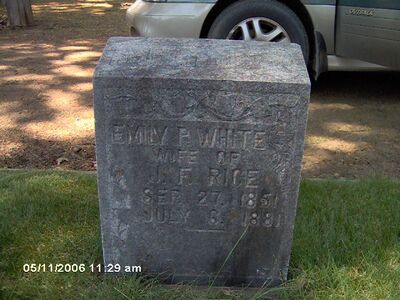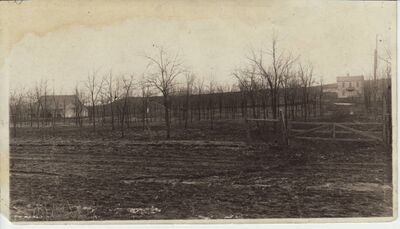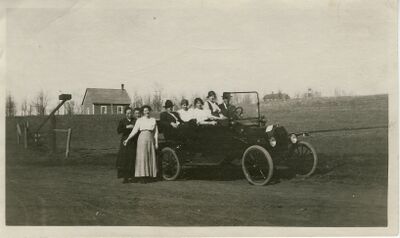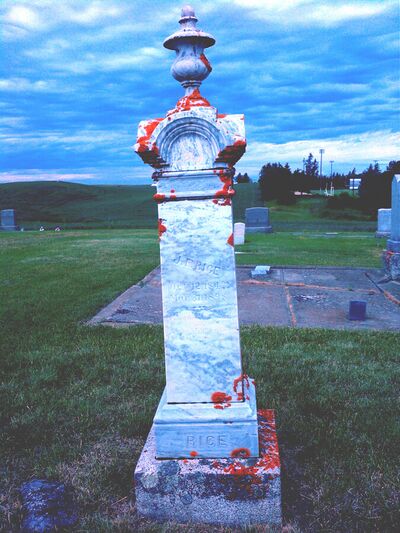Rice Homestead Quarter (NW ¼ Section 28): Difference between revisions
No edit summary |
No edit summary |
||
| Line 11: | Line 11: | ||
Jeremiah married his second wife, Sarah B. Robison Glassburn, in November 1886. Both he and Sarah appear in the 1887 census as living on this land with Jeremiah’s two children from his first marriage, Charles and Gertrude. Sarah was a neighbor living about a mile and a half away when her husband died in 1885. Jeremiah served as the executor of his estate (see the [[Bowen Railroad Quarter (NE ¼ of Section 33)| Arius Glassburn/Bowen Quarter]]). Sarah had at least two minor children at the time, but no record of what became of them has been found. | Jeremiah married his second wife, Sarah B. Robison Glassburn, in November 1886. Both he and Sarah appear in the 1887 census as living on this land with Jeremiah’s two children from his first marriage, Charles and Gertrude. Sarah was a neighbor living about a mile and a half away when her husband died in 1885. Jeremiah served as the executor of his estate (see the [[Bowen Railroad Quarter (NE ¼ of Section 33)| Arius Glassburn/Bowen Quarter]]). Sarah had at least two minor children at the time, but no record of what became of them has been found. | ||
[[file: | [[file:1910-1920-kirk-0026-copy-rice-house-and barn.jpg |400px|thumb|left|This photo was taken from what is now the Plaster Road looking east. The Rice barn is to the left and the Rice home is to the right.]] | ||
[[file: | [[file:1915-1920-kirk-0027-copy-locust-grove-school-and-rice-house.jpg |400px|thumb|right|This photo was taken cross the road from the Plaster home. In the background to the left of the car is the Locust Grove schoolhouse and to the right of the car is the Rice home and windmill.]]The homestead included a home, windmill, cistern, and barn in the southwest corner of the homestead quarter. The wooden cistern burned down around 1950 and the barn collapsed around 1985. There also was a grove of black locust trees, some of which stand today. It is possible that these trees were to qualify his separate timber culture property/ (See also Rice Timber Culture.) On the Plaster land just south of this grove, a school house was built known as the Locust Grove School. This school continued until consolidated into the Reardan Schools. | ||
[[file:2010-kirk-0020-jeremiah-f-rice-gravestone-1600.jpg|400px|thumb|right|Jeremiah Rice gravestone in the Reardan Cemetery. (Photo by Kirk Carlson)]] When Jeremiah died in 1898 at age 55, he was buried at Reardan. His will describes three quarters in his estate -- the homestead quarter (this quarter), [[Rice Timber Culture Quarter (SE ¼ Section 30)|a timber culture quarter (SE ¼ Section 30)] and the [[Rice Railroad Quarter (SW ¼ Section 21)]] that he purchased from the Northern Pacific Railroad in 1889. He left the homestead quarter to his wife, the railroad quarter to his daughter Gertrude and the timber culture quarter to his son Charles. | [[file:2010-kirk-0020-jeremiah-f-rice-gravestone-1600.jpg|400px|thumb|right|Jeremiah Rice gravestone in the Reardan Cemetery. (Photo by Kirk Carlson)]] When Jeremiah died in 1898 at age 55, he was buried at Reardan. His will describes three quarters in his estate -- the homestead quarter (this quarter), [[Rice Timber Culture Quarter (SE ¼ Section 30)|a timber culture quarter (SE ¼ Section 30)] and the [[Rice Railroad Quarter (SW ¼ Section 21)]] that he purchased from the Northern Pacific Railroad in 1889. He left the homestead quarter to his wife, the railroad quarter to his daughter Gertrude and the timber culture quarter to his son Charles. | ||
Latest revision as of 17:09, 2 March 2023
This article is part of a series. To find other articles, see Some South Reardan Homesteads.
This story is based on research, mostly on the Internet and public records. All errors are mine. Notes or items for further research are indicated with square brackets.
Jeremiah Farmer Rice was born in Missouri in 1843. He is the old second child to Charles Coleman Rice and Jane Powell. Their first child, a daughter had died as an infant. After their fifth child was born, Charles may have caught "gold fever" and moved his family California. Instead of going to the gold fields near Sacramento, Charles settled near Upper Lake, California. The records only indicate Missouri as Jeremiah's place of birth, although his siblings were born in Jackson county, Missouri. In all Charles and Jane had ten children; the last five of which were born in California.
While in California Jeremiah married Emily P. White and they have at least two children, Charles P. and Gertrude. Charles was born in Denverton, California. Emily died in 1881 at age 30 and is buried in Lakeport, California some 100 miles from Denverton where Charles was born. [Jeremiah is in a Big Valley California 1880 census. need to check where Big Valley is and who was living with him at the time.]
Jeremiah moved with his two children to Reardan. He filed a Receivers’ Receipt to reserve this quarter of land in January of 1888 and a year later he got the homestead land patent. He also had a timber culture quarter granted in 1893 (see Rice Timber Culture). Timber cultures were supposed to take 10 years, so that would have put his arrival in 1883. However, there were some exceptions to the law for homesteaders. Figuring that a homestead took five years, it would have put his arrival to the land in 1884, although he does not appear in the 1885 census. In 1889 Reardan itself was established with the completion of the railroad between Spokane and Grand Coulee and Washington qualified for statehood.
Jeremiah married his second wife, Sarah B. Robison Glassburn, in November 1886. Both he and Sarah appear in the 1887 census as living on this land with Jeremiah’s two children from his first marriage, Charles and Gertrude. Sarah was a neighbor living about a mile and a half away when her husband died in 1885. Jeremiah served as the executor of his estate (see the Arius Glassburn/Bowen Quarter). Sarah had at least two minor children at the time, but no record of what became of them has been found.
The homestead included a home, windmill, cistern, and barn in the southwest corner of the homestead quarter. The wooden cistern burned down around 1950 and the barn collapsed around 1985. There also was a grove of black locust trees, some of which stand today. It is possible that these trees were to qualify his separate timber culture property/ (See also Rice Timber Culture.) On the Plaster land just south of this grove, a school house was built known as the Locust Grove School. This school continued until consolidated into the Reardan Schools.
When Jeremiah died in 1898 at age 55, he was buried at Reardan. His will describes three quarters in his estate -- the homestead quarter (this quarter), [[Rice Timber Culture Quarter (SE ¼ Section 30)|a timber culture quarter (SE ¼ Section 30)] and the Rice Railroad Quarter (SW ¼ Section 21) that he purchased from the Northern Pacific Railroad in 1889. He left the homestead quarter to his wife, the railroad quarter to his daughter Gertrude and the timber culture quarter to his son Charles.
After Jeremiah's death Sarah remarried again, this time to Manuel Glassburn (a second cousin of her first husband), and in 1905 sold her quarter to John Hughes who in turn sold the land immediately to A. C. Plaster for a 4% profit. A. C. and Luella’s son Roy farmed this quarter. Roy and his wife, Irma Koeller, the daughter of William and Mary Koeller, lived in this house between their marriage in 1915 until their home was built on the Fred Mahrt homestead quarter in 1917. More information about Sarah and Manuel is told with the Glassburn/Bowen Quarter.
Jeremiah's daughter, Gertrude, married Victor Imhoff, a Reardan neighbor, who became a train dispatcher first in Spokane and later in Fresno, CA. She had two children, Roy and Myrtle [probably born in 1902 in Spokane]. She sold the railroad quarter to John Mahrt in 1909. She died in 1964.
Charles’ story is told with the Rice Timber Culture Quarter (SE ¼ Section 30).
This article is part of a series. To find other articles, see Some South Reardan Homesteads.



